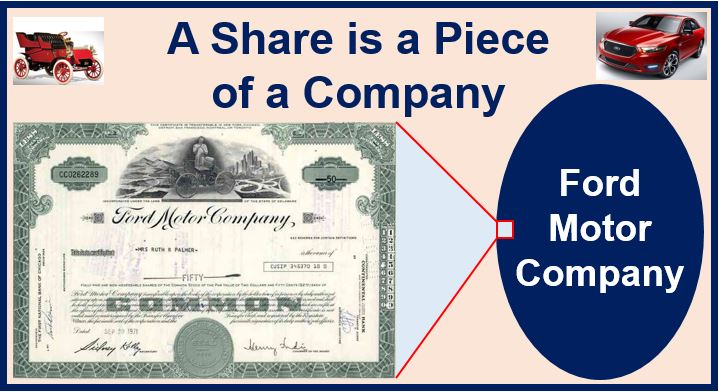A Share is a single unit of ownership in a company or financial asset.
It is essentially an exchangeable piece of value of a company that can fluctuate up or down, depending on several different market factors.
Companies divide capital into shares as a means of raising capital. Shares are also known as stocks.
There are two main types of shares: common shares, which British people call ordinary shares, and preference shares.
Ordinary shareholders have voting rights and receive dividends according to profit levels. Whereas preferred shareholders don’t usually have voting rights but have priority in the payment of dividends.
The value of a share that a company issues depends on its face value – the capital of a company divided by the total number of shares. A firm’s authorized capital refers to the maximum amount in shares it is allowed to sell.

People who own shares in a company are called shareholders or stockholders. Shareholders receive income from the shares they own on a routine basis – these are called dividend payments.
Shares are exchanged through a stockbroker – who acts as the middle man or woman.
How is a share valued?
The value of a share depends on several key market principles. Put simply, a share’s value is what people are willing to pay for it if is on sale. Shares are not sold at any given time though – the transaction of shares strongly depends on the liquidity of the market.
Investors buy shares because they predict the value of the share will go up, and for the streaming long term dividend payments.
Companies try to please investors by allowing shareholders to vote on who directs the company and other major decisions. Stockholders are, after all, the owners of the company.
When the press writes favorably about a particular stock, it might suddenly become popular. Many analysts make optimistic predictions. Often, they are startup companies. We call these types of shares glamour stocks. However, if their glamour fades, their prices can crash.
Market sentiment – a major factor driving share values
When future profits are expected to rise, the price of shares rises too. Experts say this market sentiment is often more powerful than the straightforward publication of profit data.
As illogical as it may sound, if an analyst or expert says that a company will double its profits, that simple prediction will push up the value of its shares. Obviously, the analyst needs to be well recognized.
When the profits are published, the price of that company’s shares will probably fall if the prediction was wrong.
In order to appreciate how markets behave, especially individual shares, it is important to understand the dynamics of market sentiment.
In the past, stock certificates were issued as evidence of ownership of a share. However, nowadays systems such as CREST record a shareholder’s ownership electronically.
Shares are sold, listed and traded on stock exchanges. The largest stock exchange markets in the United States are the New York Stock Exchange (NYSE), followed by NASDAQ, in Europe the London Stock Exchange is the biggest.
Unlisted share are traded overt the counter. The whole environment of trading in shares, including those bought and sold in stock exchanges and over the counter, is known as the stock market.
Technological advancements have further democratized access to stock markets, enabling retail investors to participate through online platforms with unprecedented ease and flexibility.
The introduction of blockchain technology is poised to revolutionize how shares are issued, traded, and recorded, promising enhanced security and transparency in transactions.”
